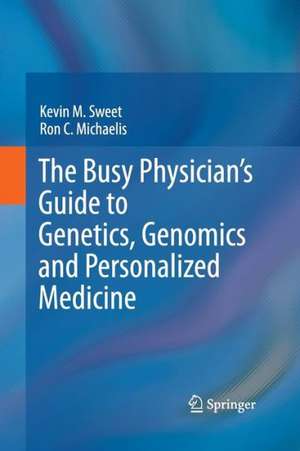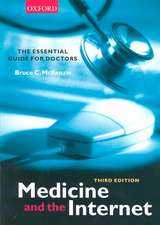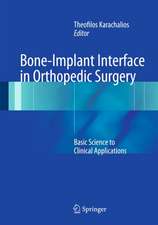The Busy Physician’s Guide To Genetics, Genomics and Personalized Medicine
Autor Kevin M. Sweet, Ron C. Michaelisen Limba Engleză Paperback – 18 oct 2014
| Toate formatele și edițiile | Preț | Express |
|---|---|---|
| Paperback (1) | 1406.42 lei 6-8 săpt. | |
| SPRINGER NETHERLANDS – 18 oct 2014 | 1406.42 lei 6-8 săpt. | |
| Hardback (1) | 1412.06 lei 6-8 săpt. | |
| SPRINGER NETHERLANDS – 22 apr 2011 | 1412.06 lei 6-8 săpt. |
Preț: 1406.42 lei
Preț vechi: 1480.45 lei
-5% Nou
Puncte Express: 2110
Preț estimativ în valută:
269.13€ • 287.78$ • 224.39£
269.13€ • 287.78$ • 224.39£
Carte tipărită la comandă
Livrare economică 17 aprilie-01 mai
Preluare comenzi: 021 569.72.76
Specificații
ISBN-13: 9789401782715
ISBN-10: 9401782717
Pagini: 236
Ilustrații: XXIV, 211 p.
Dimensiuni: 155 x 235 x 12 mm
Greutate: 0.34 kg
Ediția:2011
Editura: SPRINGER NETHERLANDS
Colecția Springer
Locul publicării:Dordrecht, Netherlands
ISBN-10: 9401782717
Pagini: 236
Ilustrații: XXIV, 211 p.
Dimensiuni: 155 x 235 x 12 mm
Greutate: 0.34 kg
Ediția:2011
Editura: SPRINGER NETHERLANDS
Colecția Springer
Locul publicării:Dordrecht, Netherlands
Public țintă
Professional/practitionerCuprins
PREFACE. INTRODUCTION. 1 GENETIC VARIABILITY PROVIDES THE BIOCHEMICAL BASIS FOR OUR INDIVIDUALITY, INCLUDING DIFFERENCES IN OUR SUSCEPTIBILITY TO MANY COMMON DISEASES. 1.1 Defining And Differentiating Between Genetics And Genomics. 1.2 The Structure Of DNA, The Variability Of The DNA Sequence And The Independent Inheritance Of Gene Alleles By Siblings. 1.3 A Review Of The Process Whereby A Gene Makes Its Protein. 1.4 A Typical Gene’s Sequence And The Level Of Activity In The Associated Protein Are As Variable As Any Other Human Biological Trait. 1.5 Risk-Increasing Alleles Have Variable Frequencies And Variable Levels Of Penetrance. 1.6 Polymorphisms In Promoter Regions And Other Non-Coding Sequences Influence The Activity Of Our Proteins. 1.7 Epigenetic Factors Also Control Gene Activity. 1.8 Common Types Of Variants In The Human DNA Sequence . 1.9 Common Multifactorial Diseases Are Genetic Disorders, Despite Their Non-Mendelian Patterns Of Inheritance. 1.10 Personalized Medicine Testing May Allow You To Better Tailor The Treatment To The Individual, And May Allow The Individual To Make Healthier Choices. 2 MAKING THE MOST OF FAMILY HISTORY INFORMATION, SINGLE GENE DISORDERS AND MENDELIAN PATTERNS OF INHERITANCE, AND WHEN TO REFER TO A GENETIC SPECIALIST. 2.1 Maximizing The Use Of Family Medical History In Disease Risk Assessment. 2.2 Single Gene Disorders. 2.3 Understanding Mendelian Patterns Of Inheritance (Single Gene Disorders). 2.4 Assessing The Risk Of Recurrence In Mendelian Pedigrees. 2.5 Carrier Frequencies For The More Common Recessive Single-Gene Disorders. 2.6 Referring To A Genetic Specialist. 2.7 New Genomic Applications For Complex Disease Will Change Approaches To Genetic Counseling and Personalized Medicine. 3 TYPES OF GENETIC TESTS AND ISSUES ASSOCIATED WITH THE INTERPRETATION OF THEIR RESULTS. 3.1 Accessing Current Information On Available Genomic Medicine Tests. 3.2 Standard Format For Genetic Test Results. 3.3 Risk-Increasing Gene Alleles OftenHave Limited Penetrance. 3.4 The ACCE And EGAPP Projects Evaluate Emerging Genetic Tests. 3.5 Assessing The Usefulness Of A Genomic Test. 3.6 Even An Informative Genetic Test May Have Limited Clinical Utility. 3.7 Single Nucleotide Polymorphisms (SNPs) Are The Most Commonly Tested Polymorphisms. 3.8 There Are Many Small Deletions And Insertions In Different People's DNA. 3.9 Repeated Sequence Length Polymorphisms And Microsatellite Analysis. 3.10 Chromosome Rearrangements Can Contribute To Some Complex Disorders. 3.11 Copy Number Variation Is Surprisingly Frequent. 3.12 It Is Sometimes Necessary To Determine The Level Of Activity In Specific Genes. 3.13 Mitochondrial DNA Variants Are Also Relevant. 3.14 Many Epigenetic Factors That Influence Gene Activity Are Amenable To Testing. 3.15 Some Tests Assess Characteristics Of The Pathogen. 3.16 Cancer Analyses Often Must Include Somatic Mutations As Well As Germline Mutations. 3.17 Predictive Algorithms Must Include Both Genetic And Nongenetic Factors. 3.18 Genome-Wide Association (GWA) Studies Provide Insights Into The Mechanisms For Disease, But Their Results Are Often Not Clinically Useful. 3.19 A Brief Introduction To The Most Important Technological Advances. 4 TOWARD THE SAFER AND MORE EFFECTIVE USE OF PRESCRIPTION DRUGS: PHARMACOGENETICS. 4.1 Genetic Polymorphisms Affect Both The Pharmacokinetics And Pharmacodynamics Of Many Prescription Drugs. 4.2 Improving On The Disease-Oriented Approach To Prescribing Drugs. 4.3 Limitations Of Genetic Testing. 4.4 Dose-Calculating Algorithms Must Take Genetic And Nongenetic Factors Into Account. 4.5 Epigenetic Factors Must Be Factored Into Many Algorithms As Well. 4.6 Polymorphisms In The CYP450 Genes Influence The Pharmacokinetics Of Many Commonly Prescribed Drugs.4.7 Other Functional Polymorphisms That Affect The Pharmacokinetics Of Multiple Drugs. 4.8 Polymorphisms In The Genes Encoding Beta-Adrenergic Receptors Influence The Pharmacodynamics Of Beta-Blockers. 4.9 KeepingUp To Date With FDA Approvals And The Status Of The Field. 5 TAKING A PERSONALIZED MEDICINE APPROACH TO BREAST AND COLON CANCER. 5.1 Cancer Is A Complex Genetic Disease. 5.2 Breast Cancer Gene Variants With Low Penetrance. 5.3 Further Research Will Increase Accuracy And Standardize Risk-Estimating Algorithms. 5.4 Useful Online Programs To Calculate Breast Cancer Risk. 5.5 Highly Penetrant Breast Cancer Gene Variants. 5.6 Hereditary Breast-Ovarian Cancer Syndrome. 5.7 BRCA Gene Testing. 5.8 Effects Of Possessing Risk-Increasing BRCA Alleles. 5.9 Cancer Screening and Prevention Measures For Female BRCA Variant Carriers 5.10 BRCA Mutation Positive Case Study. 5.11 Colon Cancer Gene Variants With Low Penetrance. 5.12 Highly Penetrant Colorectal Cancer Gene Variants. 5.13 Lynch Syndrome 5.14 Molecular Genomic Testing In Patients Suspected Of Having Lynch Syndrome. 5.15 Cancer Screening and Prevention Measures For LS Mutation Carriers. 5.16 Familial Adenomatous Polyposis. 5.17 APC Mutation Screening In Familial Adenomatous Polyposis. 5.18 Cancer Screening and Prevention Measures For APC Mutation Carriers. 5.19 Personalizing Drug Therapy For Cancer Patients. 6 PERSONALIZING RISK ASSESSMENTS AND TREATMENTS FOR COMPLEX CARDIOVASCULAR DISEASE. 6.1 Cardiovascular Diseases Are Complex, Multifactorial Diseases With Highly Variable Phenotypes. 6.2 Family History And CVD Risk. 6.3 Useful Online Programs To Estimate Heart Disease Risk. 6.4 CVD-Associated Gene Variants Have Been Particularly Difficult To Identify. 6.5 Most CVD-Associated Gene Variants Have Low Penetrance. 6.6 Low-Penetrance Gene Variants That Affect Predisposing Phenotypes. 6.7 Jameer’s Story. 6.8 CVD Gene Variants With High Penetrance: Familial Hypercholesterolemia (FH). 6.9 Molecular Genomic Testing In Patients Suspected Of Having FH. 6.10 CVD Gene Variants With High Penetrance: Hypertrophic Cardiomyopathy (HCM). 6.11 Therapy and Prevention Measures For HCM Mutation Carriers. 6.12 Genes Influencing The Risk For Other Cardiomyopathies. 6.13 Cardiovascular Pharmacogenomics. 7 OTHER MULTIFACTORIAL DISORDERS FOR WHICH GENETIC/GENOMIC TESTING IS PROVIDING INSIGHTS. 7.1 Age-Related Macular Degeneration. 7.2 Type 2 Diabetes. 7.3 Personalizing The Approach To Psychiatric Disorders. 7.4 Personalizing The Treatment For Substance Abuse. 7.5 Alzheimer Disease And Cognitive Decline In Aging. 7.6 Asthma And Other Respiratory Disorders. Epilogue
Recenzii
“This is a timely book about personalized genomic medicine. … is essential for the physician farther out from training who may not be up to date with genetic advances made in the last decade and is also a helpful refresher for the more recent graduate. … this book would make a great addition to a personal physician’s library as a reference book. … a great addition to a medical school or residency program library.” (Laura Shaw, Family Medicine, Vol. 45 (10), November-December, 2013)
“The book offers the reader a bird’s eye view of the broad field of genetics and genomics and its application to personalized medicine. It will prove as an enjoyable reading for both practicing physicians as well as students interested to venture into the vast and interesting field of genetics and genomics.” (Ashwin Dalal, IndianJournal of Medical Research, Vol. 136, July, 2012)
“The book offers the reader a bird’s eye view of the broad field of genetics and genomics and its application to personalized medicine. It will prove as an enjoyable reading for both practicing physicians as well as students interested to venture into the vast and interesting field of genetics and genomics.” (Ashwin Dalal, IndianJournal of Medical Research, Vol. 136, July, 2012)
Textul de pe ultima copertă
In the coming decade, the focus of medicine will shift from a disease-oriented approach, where the physician prescribes according to the disease the patient has, to a personalized approach, in which the physician first considers the patient’s individual biochemistry before prescribing a treatment. Personalized medicine has the potential to improve efficacy and safety in virtually all fields of medicine. Unfortunately, few physicians feel confident in their ability to apply the principles of genetics and genomics upon which personalized medicine is based to their practice.
This book is intended to help the practicing physician understand and apply the principles of genetic and genomic medicine, regardless of his/her level of background in the field. It provides a thorough foundation/review of classical genetic principles, with an emphasis on how these principles apply to personalized medicine and common complex diseases. In addition, it provides a wide-ranging review of the inroads that personalized medicine has made into several fields, including cancer, psychiatric disorders, cardiovascular disease, substance abuse, Alzheimer disease, respiratory diseases, type 2 diabetes and macular degeneration.
Most importantly, this book is intended to enable the practicing physician, physician assistants and their entire healthcare team to anticipate the developments that will emerge in the near future, and stay current with the field as it expands.
This book is intended to help the practicing physician understand and apply the principles of genetic and genomic medicine, regardless of his/her level of background in the field. It provides a thorough foundation/review of classical genetic principles, with an emphasis on how these principles apply to personalized medicine and common complex diseases. In addition, it provides a wide-ranging review of the inroads that personalized medicine has made into several fields, including cancer, psychiatric disorders, cardiovascular disease, substance abuse, Alzheimer disease, respiratory diseases, type 2 diabetes and macular degeneration.
Most importantly, this book is intended to enable the practicing physician, physician assistants and their entire healthcare team to anticipate the developments that will emerge in the near future, and stay current with the field as it expands.
Caracteristici
Comprehensive review of the genetic/genomic principles underlying personalized medicine Wide-ranging review of current progress in personalized medicine for common, complex disease Concise, to-the-point coverage written in an easy-to-read writing style Listing of valuable online resources to apply in patient risk assessment and personalized medicine













